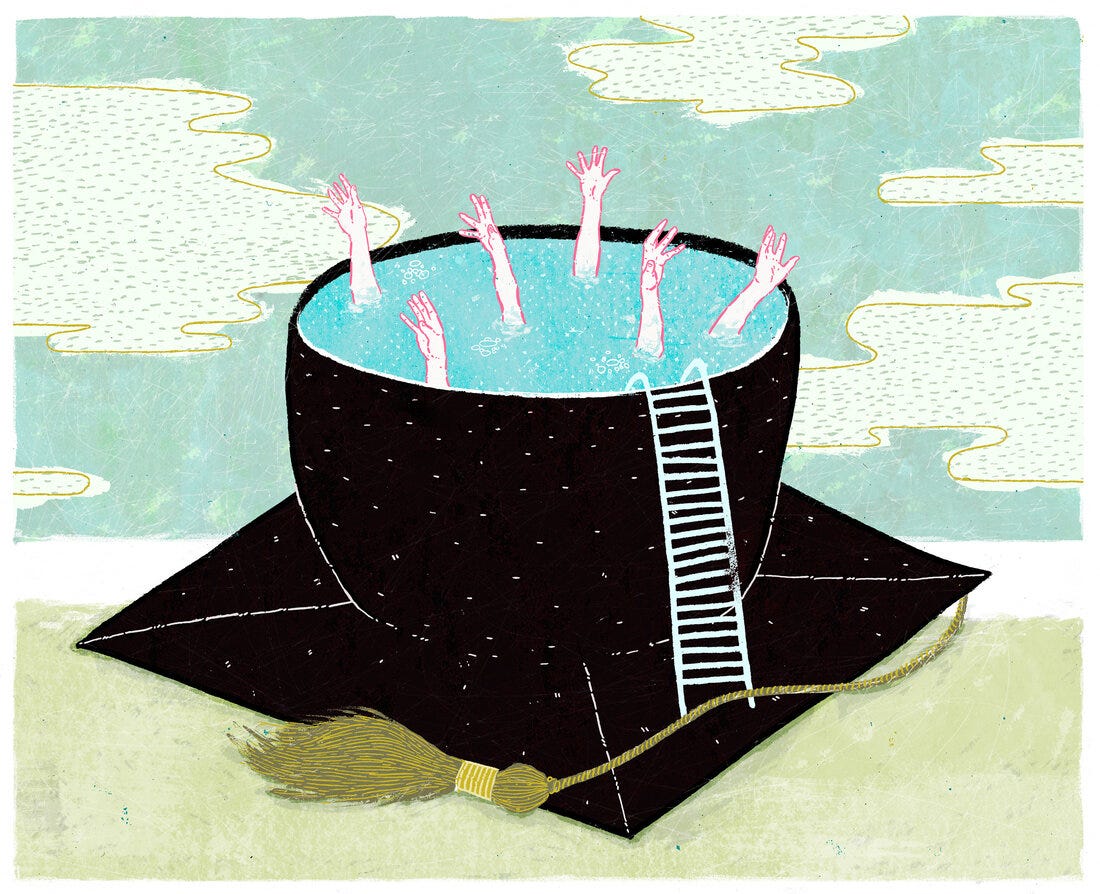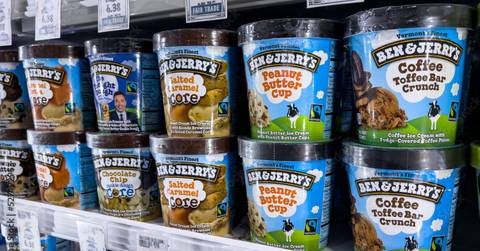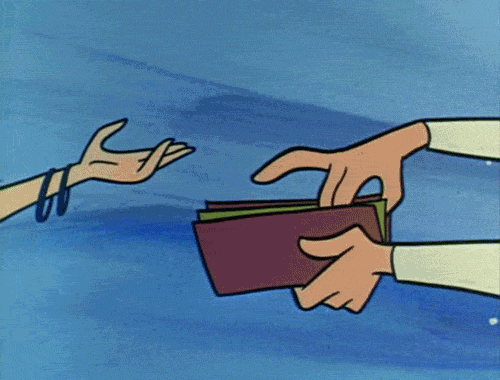mid-30s millennial chooses ice cream over money!
social media finance gurus, money anxiety, & shame spirals
Another season of Nervous Wreckage is here! Stay tuned the next several weeks for new newsletters, mini-essays, and more!
I don’t know exactly how it came up on my algorithm, but the YouTube thumbnails were clickbait and I fell for them. I more than fell for them—I dove straight down a rabbit-hole.
This YouTuber in question does a “financial audit” for people who are struggling to navigate serious debt (I’m not naming this person or linking to their content directly, but if you want to find it it’s pretty easy). While this host is not necessarily a CPA, guests volunteer for free financial advice in exchange for coming on the show in the vein of a Dave Ramsey or Suze Orman (just with a hipster haircut). The host talks about how he didn’t understand finances himself in his early 20s and delivers “tough love” advice to his guests to help them get out of debt as quickly as possible without declaring bankruptcy in addition to avoiding debt consolidation. The vast majority of his guests have maxed out several credit cards, are drowning in student or medical debt, and/or have taken out several payday loans. The host of the show breaks down the guest’s spending and tries to address their spending habits with a sharp, and sometimes cringe-worthy, reality check.

Each video is accompanied by a thumbnail with a filter applied over the guest’s face to make them appear dumber or more alien, as well as a mocking, shaming tag line like 25-YEAR-OLD WON’T WORK or BROKE SINGLE MOM MAXES OUT CREDIT CARDS FOR TATTOOS or INCEL LOSES APARTMENT TO PAY FOR ONLYFANS or DEBT-RIDDEN NEWLYWEDS HEADED FOR DIVORCE?! These are always exaggerations, usually highlighting one “weakness” (which is not my assessment necessarily) or judgmental thought the viewer might have when they hear the guest’s backstory and blown way out of proportion. A lot of these guests are young too—in their early twenties, with little to no financial literacy. Many of them had little understanding of how predatory credit card companies and other financial institutions can be.
While I’m not proud of watching some of these, I did have a reason at first. Or that’s what I’ve told myself. I’d been doing a lot of work to save up money and was hoping for some tips about how to perhaps budget a bit better, get a little more bang for my buck. Groceries are getting more expensive. Public transit is getting more expensive. Hell, being alive has gotten so fucking expensive.
Given how popular the videos seemed to be (with hundreds of thousands, if not millions, of views within a day or two of publication), I thought maybe there was something useful buried in there. I can admit, it was not my best judgement call.
Now, to be clear, I’m not drowning in debt the way most of these guests on this finance show are. I’m also deeply lucky that my mom, who is very financially literate, instilled a lot of that knowledge in me from a young age. That’s a huge privilege that I’m grateful for everyday.
My choice to start watching was about trying to improve my pre-existing habits, but continuing to watch wasn’t about budgeting a little better. It was about shame. The channel was targeting slightly better-off audience members, myself included, to feel just a little better about themselves and it worked.
I stopped watching after a month or so because the show felt so exploitative, so shaming, and I knew I wasn’t exactly perfect when it came to everyday spending myself. It was cringe-y to see the most vulnerable parts of people ripped open for public ridicule in the name of free financial advice, in part because it made me question my own justifications for buying things I wanted rather than needed. The shame stuck with me when I shopped—am I going to buy a name-brand thing at the grocery store when generic would suffice? Do I need to buy these pants full-price or can I wait until they are on sale or—even better—can I reason my way out of needing them at all?
I had to interrogate how this channel was actually approaching the people it said it was helping: is that “broke single mom” really in financial trouble because she has tattoos? Or is the small joy of getting a tattoo an easy thing to blame in an otherwise bleak situation where she had to leave an abusive ex? Is a trans person on the show, who is in debt for medical care that affirms their gender identity, really someone who needs to be further shamed? What about a couple where one person co-signed on a loan the other person took out for something most people would have said no to? Are they both bad people for making decisions that someone else would not have made because they thought they were doing the right thing to help a loved one?
Instead of learning anything new, I became acutely aware of my own everyday purchases and felt intense guilt for small, trivial decisions. I added a impulse-bought a package of pimple patches that weren’t on my list of toiletries to buy at Target. I bought a cold seltzer at Duane Reade “as a treat” while out running errands despite having a SodaSteam at home. I bought a pint of Ben & Jerry’s Chocolate Therapy ice cream (PMS emergency) at the bodega, where I know full and well they charge a few dollars more than other places for “premium” ice cream, because it is next to my apartment and its convenient. And while being mindful of those things is certainly good, I don’t know that it has been helpful in the bigger scheme of financial planning and my own self-confidence.

So why am I admitting that I watched this shit? Why am I admitting to feeling better about myself sometimes after watching? In some ways, this speaks to the proverbial millennial/Gen Z avocado toast shame, as I like to call it. This idea that our generation spends more frivolously than, say, any other. And that’s the reason why we can’t buy houses and we’ve sunk the diamond industry and destroyed the car market and whatever else. That our economic struggles have easy answers and solutions, if only we were disciplined enough to strive to better our current situations.
But generally speaking, on the whole, we aren’t the ones who tanked those markets—we’re the ones who’ve had to contend with serious inflation, skyrocketing houses costs, a waffling economy always on the brink of recession or worse, the destruction of the middle class, lack of promotions, crippling student loan debt, and a variety of other disasters set in motion by those who came before us. Sure, individual responsibility and self-sufficiency matters, as does financial literacy. But I’d argue the people I’m surrounded by have had to be extremely thoughtful about large financial purchases like trying to buy a home or go back to school or make big career moves in a way that previous generations never had to be. And the politicians we’ve elected so far have not come through on promises to make life more affordable. We’ve been on our own, navigating waters that forces larger than ourselves have purposely polluted and made as murky as possible, which has transformed the financial landscape and made it so much more fraught and impossible.
Rather than de-stigmatizing the shame we’ve associated with debt in this country, we have somehow continued to place a high moral value to avoiding debt all together, a bizarre extension of the prosperity gospel (having more money = heaven; having debt = being Satan’s best friend). What would be more helpful for a lot of the people on this finance show would likely be an acknowledgement that existing as an adult human in the United States in 2024 unfortunately almost always necessitates some debt at some point, unless you come from extreme privilege. And even then—chances are, you’ll have to take on some debt too.
So is paying an extra $2 for my monthly Ben & Jerry’s PMS ice cream pint at my next door bodega actually the issue here? Is that extra $24/year the reason I cannot currently afford a house? And even if I put that on my credit card, is that small pleasure a reason to shame myself or someone else?
To be fair to this YouTube host, he does say that he specializes in tough love for folks who have serious trouble controlling their spending and/or really want someone to confront them about their bad habits. I get that for some people, tough love is helpful when they are trying to change a difficult habit, like having a personal trainer or fitness instructor yell at you at the gym. This YouTube host is open about the fact that he uses clickbait thumbnails and titles. He also admits that his guests need to live as well—a little indulgence here or there is not the end of the world so long as they are still being disciplined and following the budget. It’s not as if he’s trying to gaslight the viewer about what he’s doing. If anything, he’s created a smart if deeply obvious business ploy: the more I click to see the latest shame-spectacle, the more money he makes.
Truthfully, this content is not really meant for me. As my third grade soccer teammates could tell you, I do not respond well to yelling or tough love (what do you mean i’m supposed to WANT someone to pass me the ball?!).
The YouTube comments for this channel seem pretty divided between people watching for the drama (“this guy is a man child, his wife should leave him”) versus people watching for financial tips who credit the channel with helping them get their spending in check (“thanks to [YouTuber name] i moved back in with my parents and paid my $10k credit card debt off in six months”). I’m glad it has helped some people to find discipline and think differently about their money. But I’m suspicious of anyone or anything that uses shame as a motivator, because shame begets anxiety, and don’t we have enough of that already? Aren’t people who are in debt dealing with enough of it?
More specifically: what am I actually getting when I click these videos besides a fleeting feeling that I’m doing better than I give myself credit for, at the expense of a person just trying to survive? And is that a transaction I really want to be a part of in the year of our lord 2024?
So I’ve stopped watching. I’m unsubscribing as I write. But that doesn’t stop the financial shame and anxiety spiral. I’m not sure what really could.
What I do know is that I’m still probably going to get my monthly B&J pint at the bodega, because yes they charge a few bucks more, but they are next door. The folks behind the counter are always kind. I enjoy the selection they typically have.
And if the past five years have taught me anything: this life is not promised. My body is not promised. And neither is my bank account or credit score.
I’m gonna go get my Chocolate Therapy.





